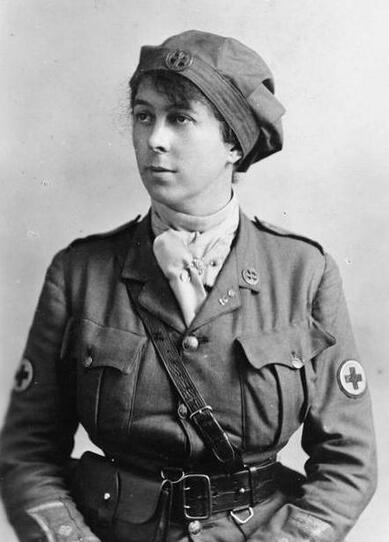GRACE McDOUGALL (1887-1963)

Grace Alexandra Smith, or Ashley-Smith, was born in Aberdeen in 1887. She went to school at Albyn, studied at Aberdeen University and then went to Belgium to learn French.
Grace joined the First Aid Nursing Yeomanry (FANY) in 1910. The FANY was formed in 1907 to rescue the wounded and to administer first aid from horseback. Recruits were trained in first aid, signalling, and cavalry movements.
By 1912, Sergeant-Major Ashley-Smith and 2nd Lieutenant Lilian Franklin were in charge and reinvented the FANY. An elaborate uniform was replaced with more practical khaki; astride riding and a new training regime was introduced; they acquired a horse-drawn ambulance; and made all-important contacts within the British military.
Grace was at sea en route to Cape Town when war was declared on 4 August 1914. She felt so strongly that the FANY had an important role to play that, on arrival, she returned immediately to Britain. The FANY quickly followed up on their contacts, but British military opinion was still that the Front was no place for a woman.
Grace thrived on opposition. On the ship back from Cape Town, she met the Belgian Minister for the Colonies, who suggested the FANY would be welcomed. In the face of some discouragement, she took herself to a British military hospital in Antwerp and drove a Belgian ambulance. The Germans rapidly over-ran Belgium. Grace refused to be evacuated in order to nurse a fatally-injured British soldier. She tended to him until he died.
Captured by the Germans, Grace wrote home expressing a frank desire to blow up the nearby German Aerodrome with dynamite which she felt was more achievable than “getting their big guns”. Grace escaped and returned to London to gather reinforcements and equipment, realising the FANY’s services would be enhanced by having their own transport. She happened upon an exiled Aberdonian garage owner there and persuaded him to donate an ambulance.
Grace took the first small troop of six FANYs, nurses, dressers, and a driver (her brother) to Calais on 27th October 1914. In Calais they found hundreds of wounded men on stretchers on the quayside, and hospitals were overflowing. Within 2 days they took over a dirty and decayed convent school. The wounded were being brought in before the FANYs had time to unpack. From these beginnings, the FANY girls branched out into their intended function, taking ambulances up to the front line to tend the wounded.
Grace married in 1915. She was said to be the first bride to marry whilst wearing Khaki. The British refused to engage the FANY for some time. Grace was dining with Belgian officers one day and had to hide when a British General appeared as they “…are apt to send reports when they meet a woman at the Front”.
In summer 1917, Grace offered the Corps’ services to the French. Many FANY units were established along the western front, under Grace’s overall direction. By 1917, however, the War Office moved to close these down. Grace’s solution was to enlist with her staff as soldiers in the transport corps of the Belgian army. Gradually, the FANY were treated as military personnel rather than as women. One day, on duty, Grace tried to travel by one of the troop trains. On being told no woman was ever allowed on these trains, she exclaimed she ‘wasn’t a woman but a FANY!’ and proceeded to board amidst cheers. She defied a similar ban barring women from troop ships, pretending to command a company of Belgian soldiers en route to Calais
Grace persisted in negotiations with the allied nations, convinced that the FANY had much to offer. FANY competence was finally recognised by the British. Sixteen FANY ambulance drivers were the first women to drive officially for the British Army. The FANY overcame resistance to women drivers and mechanics, setting up and running hospitals, driving casualties and evacuees, servicing and repairing their vehicles, and performing nursing duties. They were often very close to enemy lines, and escaped crashes, bombings and attacks. Grace took part in these front-line activities when she was not negotiating with generals and heads of state.
On one occasion on her way to some French units with another FANY, Grace was attacked by two men. She struck one of them on the head with a tyre lever and enabled the women to get away. During shelling at Calais she was nearly electrocuted by live wires that fell round her. As it would, this work took its toll on her and her staff, and she feared for their safety, but she was undeterred.
Grace won multiple military decorations from the French and Belgians. Her heroism and dedication were not recognised in any formal way by the British. Probably few Aberdonians have heard of her, despite the fact that the City donated a “beautiful Bon Accord ambulance”. The role of the FANY in the war, driven by Grace, proved that women had a valuable role and paved the way for other women in the armed forces.
Grace McDougall’s two brothers were both killed in the war. Her memoir ‘Five Years with the Allies’ ends with the following reflection:
“There is a statue in Calais, well known to FANYs, called ‘The Brave Boys of Calais’, and if ever a millionaire has money to chuck about he could do worse than put up a statue in Calais, with a FANY in khaki on top and a motor ambulance in bas-relief, and engrave it with these names, as the khaki girls of Calais!”
They did not receive their statue…. However, Grace won her uphill battle to establish the credentials and usefulness of the FANY, which continues to the present day as a highly-respected volunteer unit of the British armed forces.
Grace died in 1963. There is a memorial tablet to her in the old churchyard at Glentanar Kirk listing some of her various honours: Croix de Guerre, Médaille D’Honneur, Ordre de Leopold II, Médaille de la Reine Elizabeth, Médaille Secours de Blessés Militaires.
Entry written by Jean Abbot & Carey Fraser
Grace joined the First Aid Nursing Yeomanry (FANY) in 1910. The FANY was formed in 1907 to rescue the wounded and to administer first aid from horseback. Recruits were trained in first aid, signalling, and cavalry movements.
By 1912, Sergeant-Major Ashley-Smith and 2nd Lieutenant Lilian Franklin were in charge and reinvented the FANY. An elaborate uniform was replaced with more practical khaki; astride riding and a new training regime was introduced; they acquired a horse-drawn ambulance; and made all-important contacts within the British military.
Grace was at sea en route to Cape Town when war was declared on 4 August 1914. She felt so strongly that the FANY had an important role to play that, on arrival, she returned immediately to Britain. The FANY quickly followed up on their contacts, but British military opinion was still that the Front was no place for a woman.
Grace thrived on opposition. On the ship back from Cape Town, she met the Belgian Minister for the Colonies, who suggested the FANY would be welcomed. In the face of some discouragement, she took herself to a British military hospital in Antwerp and drove a Belgian ambulance. The Germans rapidly over-ran Belgium. Grace refused to be evacuated in order to nurse a fatally-injured British soldier. She tended to him until he died.
Captured by the Germans, Grace wrote home expressing a frank desire to blow up the nearby German Aerodrome with dynamite which she felt was more achievable than “getting their big guns”. Grace escaped and returned to London to gather reinforcements and equipment, realising the FANY’s services would be enhanced by having their own transport. She happened upon an exiled Aberdonian garage owner there and persuaded him to donate an ambulance.
Grace took the first small troop of six FANYs, nurses, dressers, and a driver (her brother) to Calais on 27th October 1914. In Calais they found hundreds of wounded men on stretchers on the quayside, and hospitals were overflowing. Within 2 days they took over a dirty and decayed convent school. The wounded were being brought in before the FANYs had time to unpack. From these beginnings, the FANY girls branched out into their intended function, taking ambulances up to the front line to tend the wounded.
Grace married in 1915. She was said to be the first bride to marry whilst wearing Khaki. The British refused to engage the FANY for some time. Grace was dining with Belgian officers one day and had to hide when a British General appeared as they “…are apt to send reports when they meet a woman at the Front”.
In summer 1917, Grace offered the Corps’ services to the French. Many FANY units were established along the western front, under Grace’s overall direction. By 1917, however, the War Office moved to close these down. Grace’s solution was to enlist with her staff as soldiers in the transport corps of the Belgian army. Gradually, the FANY were treated as military personnel rather than as women. One day, on duty, Grace tried to travel by one of the troop trains. On being told no woman was ever allowed on these trains, she exclaimed she ‘wasn’t a woman but a FANY!’ and proceeded to board amidst cheers. She defied a similar ban barring women from troop ships, pretending to command a company of Belgian soldiers en route to Calais
Grace persisted in negotiations with the allied nations, convinced that the FANY had much to offer. FANY competence was finally recognised by the British. Sixteen FANY ambulance drivers were the first women to drive officially for the British Army. The FANY overcame resistance to women drivers and mechanics, setting up and running hospitals, driving casualties and evacuees, servicing and repairing their vehicles, and performing nursing duties. They were often very close to enemy lines, and escaped crashes, bombings and attacks. Grace took part in these front-line activities when she was not negotiating with generals and heads of state.
On one occasion on her way to some French units with another FANY, Grace was attacked by two men. She struck one of them on the head with a tyre lever and enabled the women to get away. During shelling at Calais she was nearly electrocuted by live wires that fell round her. As it would, this work took its toll on her and her staff, and she feared for their safety, but she was undeterred.
Grace won multiple military decorations from the French and Belgians. Her heroism and dedication were not recognised in any formal way by the British. Probably few Aberdonians have heard of her, despite the fact that the City donated a “beautiful Bon Accord ambulance”. The role of the FANY in the war, driven by Grace, proved that women had a valuable role and paved the way for other women in the armed forces.
Grace McDougall’s two brothers were both killed in the war. Her memoir ‘Five Years with the Allies’ ends with the following reflection:
“There is a statue in Calais, well known to FANYs, called ‘The Brave Boys of Calais’, and if ever a millionaire has money to chuck about he could do worse than put up a statue in Calais, with a FANY in khaki on top and a motor ambulance in bas-relief, and engrave it with these names, as the khaki girls of Calais!”
They did not receive their statue…. However, Grace won her uphill battle to establish the credentials and usefulness of the FANY, which continues to the present day as a highly-respected volunteer unit of the British armed forces.
Grace died in 1963. There is a memorial tablet to her in the old churchyard at Glentanar Kirk listing some of her various honours: Croix de Guerre, Médaille D’Honneur, Ordre de Leopold II, Médaille de la Reine Elizabeth, Médaille Secours de Blessés Militaires.
Entry written by Jean Abbot & Carey Fraser
- FANY photographic archive | History. FANY (PRVC) – Princess Royal’s Volunteer Corps. Retrieved 4 March 2020.
- Terry, Roy. "McDougall, Grace Alexandra (1887–1963)". Oxford Dictionary of National Biography (online ed.). Oxford University Press. doi:10.1093/ref:odnb/59610. (Subscription or UK public library membership required.)
- Lee, Janet (2012). War Girls: The First Aid Nursing Yeomanry in the First World War. Manchester University Press. ISBN 978-0-71906-712-9.
- https://en.wikipedia.org/wiki/Grace_McDougall
- McDougall, Grace: A Nurse at the War: Nursing Adventures in Belgium and France (US edition of "Nursing Adventures: A F.A.N.Y. in France"; New York: R. M. McBride and Co., 1917)



